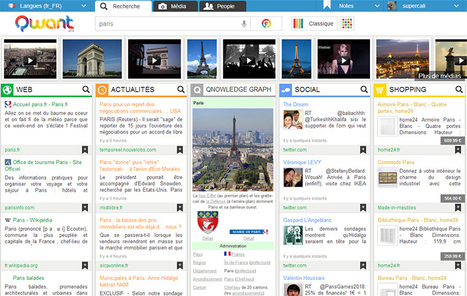Via Robin Good
Get Started for FREE
Sign up with Facebook Sign up with X
I don't have a Facebook or a X account
 Your new post is loading... Your new post is loading...
 Your new post is loading... Your new post is loading...

wanderingsalsero's curator insight,
July 12, 2013 10:54 PM
Seems to me this could be used to make some great content for blogs...and the link could be used as Facebook content. 
Greg Longmuir's curator insight,
July 16, 2013 12:55 PM
I guess you can never have enough curating, in this digital age anything that can keep you up to date and help visibility is worth a try. I like the way the simplify everything. I'm not sure but even with all this info I still may feel like I'm missing something and go to the individual sites anyway. But to see what the landscape looks like in a quick view Qwant is pretty cool. 
Alfredo Corell's curator insight,
July 17, 2013 2:09 PM
A new meta-search engine... deserves a visit

janlgordon's comment,
January 31, 2012 12:27 PM
This is an excellent piece, as always, thank you Robin!
|

Sue Alexander's curator insight,
April 20, 2014 3:07 PM
Yes, it is the world's longest infographic, but who could expect the research resources of Google to fit anywhere else? Good stuff!

Denise Lombardo's curator insight,
April 21, 2014 9:49 PM
Some great tips and tricks here, even for younger students learning to refine their searches.

carldowse's curator insight,
May 27, 2014 4:17 AM
Very useful productivity tips for teachers and learners |







![The Ability To Extract and Communicate Insight from Data It's Going To Be Huge: McKinsey Quarterly [Video] | Digital Curation in Education | Scoop.it](https://img.scoop.it/JhPPX2ck-2VX3w7sz-h8Gjl72eJkfbmt4t8yenImKBVvK0kTmF0xjctABnaLJIm9)










Cómo usar las colecciones:
http://www.ilusual.com/como-usar-las-colecciones-de-google-plus-guia
Google has just introduced "Collections", for Google+, a new service which allows any Google+ user to group his posts by topic and to create public, shareable collections of his favorite links, articles, videos and images.
To use Google Collections, simply go to your G+ profile page and then select "Collections" on the drop down menu appearing on the top left part of the page.
"Each collection can be shared publicly, privately, or with a custom set of people. Once you create your first collection, your profile will display a new tab where other people can find and follow your collections."
You can either create new posts containing whatever type of content inside a collection, or assign an existing, published post to a collection you have just created.
You can create as many collections as you like.
Google+ Collections is available on the web and on Android (iOS coming later).
My comment: Google+ Collections adds opportunity for creating additional value to G+ users by letting interests drive community engagement. This is a feature that sooner or later any social network will offer.
Free to use.
Try it out now: https://plus.google.com/collections/welcome
More info:
Official Google announcement: https://plus.google.com/+googleplus/posts/7ZpGWeou2sV
Featured collections: https://plus.google.com/collections/featured
See also the official review from Techcrunch:
http://techcrunch.com/2015/05/04/google-turns-users-into-content-curators-with-new-collections-feature/
Video tutorial: https://youtu.be/gtVNkbtS9g8